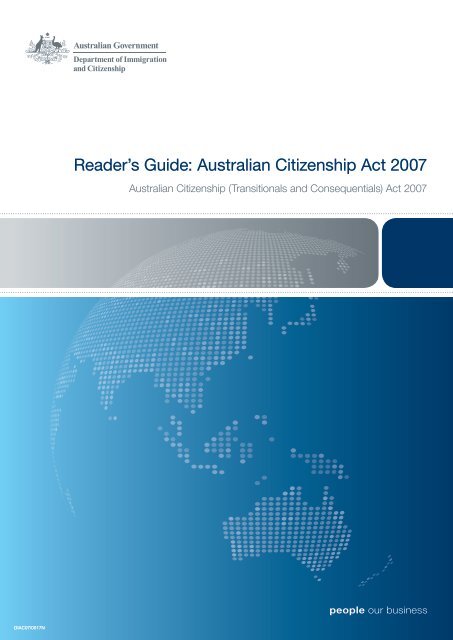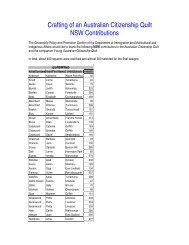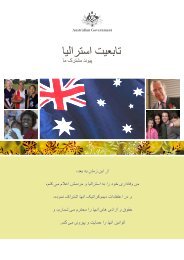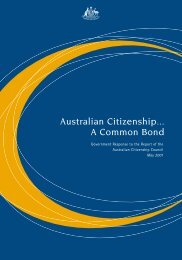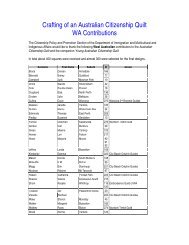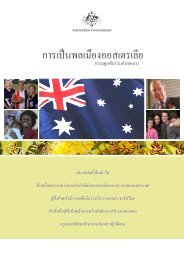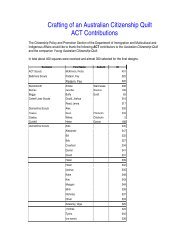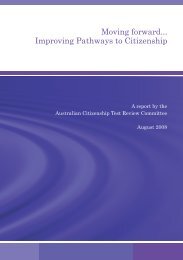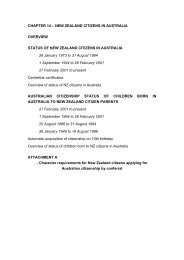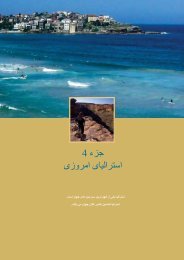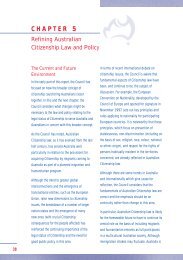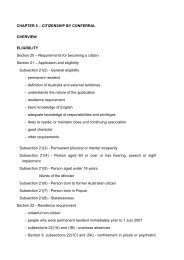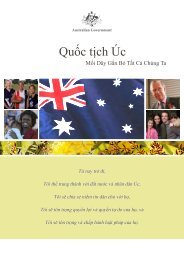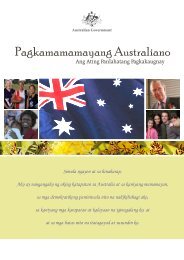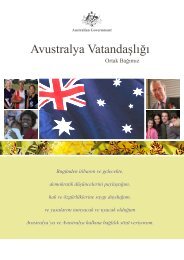Readers Guide: Australian Citizenship Act 2007
Readers Guide: Australian Citizenship Act 2007
Readers Guide: Australian Citizenship Act 2007
Create successful ePaper yourself
Turn your PDF publications into a flip-book with our unique Google optimized e-Paper software.
Reader’s <strong>Guide</strong>: <strong>Australian</strong> <strong>Citizenship</strong> <strong>Act</strong> <strong>2007</strong><br />
<strong>Australian</strong> <strong>Citizenship</strong> (Transitionals and Consequentials) <strong>Act</strong> <strong>2007</strong>
© Commonwealth of Australia October <strong>2007</strong><br />
This work is copyright. You may download, display, print and reproduce this<br />
material in unaltered form only (retaining this notice) for your personal, noncommercial<br />
use or use within your organisation. Apart from any use as permitted<br />
under the Copyright <strong>Act</strong> 1968, all other rights are reserved.<br />
Requests for further authorisation should be directed to the:<br />
Commonwealth Copyright Administration,<br />
Copyright Law Branch,<br />
Attorney-General’s Department<br />
Robert Garran Officers<br />
National Circuit<br />
Barton ACT 2600<br />
Fax: 02 6250 5989<br />
Email:commonwealth.copyright@ag.gov.au.<br />
Published by the National Communications Branch of the Department of<br />
Immigration and <strong>Citizenship</strong><br />
6 Chan Street Belconnen ACT 2615<br />
ISBN 978-0-9803727-4-8
Table of contents<br />
Chapter one:<br />
Chapter two:<br />
Chapter three:<br />
Chapter four:<br />
Chapter five:<br />
Chapter six:<br />
Chapter seven:<br />
Attachment A:<br />
Introduction<br />
Overview of the <strong>Act</strong><br />
Becoming an <strong>Australian</strong> citizen<br />
Ceasing to be an <strong>Australian</strong> citizen<br />
Evidence of <strong>Australian</strong> citizenship<br />
Personal identifiers and other matters<br />
Transitional and consequential arrangements<br />
The Automatic Acquisition and Loss of <strong>Australian</strong><br />
<strong>Citizenship</strong> - 26 January 1949 to 30 June <strong>2007</strong>
Chapter one: Introduction<br />
• Background to the legislation<br />
• Purpose of this reader’s guide<br />
Background to the legislation<br />
The legal status of <strong>Australian</strong> citizenship has existed since the enactment on 26<br />
January 1949 of the Nationality and <strong>Citizenship</strong> <strong>Act</strong> 1948, later to become the<br />
<strong>Australian</strong> <strong>Citizenship</strong> <strong>Act</strong> 1948 (the old <strong>Act</strong>). The old <strong>Act</strong> was amended more<br />
than 30 times.<br />
In August 1998 the <strong>Australian</strong> <strong>Citizenship</strong> Council (the Council) was established<br />
as an independent body to advise on <strong>Australian</strong> citizenship matters referred to it<br />
by the Government. In a report at the end of 1999, published as <strong>Australian</strong><br />
<strong>Citizenship</strong> for a New Century (Commonwealth of Australia, 2000), the Council<br />
made 64 recommendations including in its final chapter “Refining the structure of<br />
the <strong>Australian</strong> <strong>Citizenship</strong> <strong>Act</strong> 1948”. While most of the substantive changes to<br />
the old <strong>Act</strong> recommended in the Council’s report (such as the repeal of section<br />
17 to allow for <strong>Australian</strong>s to acquire dual citizenship) were implemented in 2002,<br />
no changes were made at that time to the structure of the old <strong>Act</strong>.<br />
In 2004 the Government announced a number of further changes to the old <strong>Act</strong><br />
to complement the 2002 amendments, and that the opportunity would be taken to<br />
“tidy up” the old <strong>Act</strong> consistent with the Council recommendation “to improve<br />
presentation so it is logically organized, numbered and consistent, with relevant<br />
matters dealt with together, and ensuring the balance of matters dealt with<br />
between the <strong>Act</strong> and the Regulations conforms to modern standards”. The<br />
enactment of the <strong>Australian</strong> <strong>Citizenship</strong> <strong>Act</strong> <strong>2007</strong> (the <strong>Act</strong>) gives effect to these<br />
changes and others announced by the Government in 2005 and 2006.<br />
On 17 September 2006, the <strong>Australian</strong> Government released a discussion paper<br />
seeking the community’s views on the merits of introducing a formal citizenship<br />
test. Following the consultation process, the <strong>Australian</strong> Government announced<br />
on 11 December 2006 its intention to introduce a formal citizenship test. The<br />
<strong>Australian</strong> <strong>Citizenship</strong> Amendment (<strong>Citizenship</strong> Testing) <strong>Act</strong> <strong>2007</strong> amends the<br />
<strong>Australian</strong> <strong>Citizenship</strong> <strong>Act</strong> <strong>2007</strong> from 1 October <strong>2007</strong> to give effect to this<br />
change.<br />
Purpose of this reader’s guide<br />
The Council also recommended a Reader’s <strong>Guide</strong> to the <strong>Act</strong> be written. It<br />
suggested the guide could set out in comprehensive, accessible and clear terms<br />
the key aspects of Australia’s citizenship legislation.
It recommended the following be included:<br />
• a history of the ways <strong>Australian</strong> citizenship could be acquired in the past<br />
which would allow those whose citizenship originates in provisions not<br />
currently shown in the <strong>Act</strong> to be aware of those origins;<br />
• organisation of material in the <strong>Act</strong> and Regulations;<br />
• general information on current modes of acquiring <strong>Australian</strong> citizenship;<br />
and<br />
• the circumstances in which <strong>Australian</strong> citizenship may be lost or resumed.<br />
This guide is written to assist you in understanding the <strong>Act</strong>. However, readers of<br />
the <strong>Act</strong> will see the material within it is more accessible. It includes for instance a<br />
series of simplified outlines throughout the <strong>Act</strong>:<br />
• section 2A is a simplified outline of the entire <strong>Act</strong>;<br />
• section 11A is a simplified outline of the automatic acquisition of <strong>Australian</strong><br />
citizenship provisions;<br />
• section 15A is a simplified outline of the citizenship by descent provisions;<br />
• section 19A is a simplified outline of the provisions regarding citizenship<br />
for persons adopted in accordance with the Hague Convention on<br />
Intercountry Adoption;<br />
• section 19G is a simplified outline of the citizenship by conferral<br />
provisions;<br />
• section 28A is a simplified outline of the resumption of citizenship<br />
provisions; and<br />
• section 32A is a simplified outline of the provisions for the cessation of<br />
<strong>Australian</strong> citizenship.<br />
A history of the ways <strong>Australian</strong> citizenship could be automatically acquired or<br />
lost is attached to the <strong>Readers</strong> <strong>Guide</strong>.<br />
Further information and guidance material on <strong>Australian</strong> citizenship can be found<br />
on the Department of Immigration and <strong>Citizenship</strong>’s website at<br />
www.citizenship.gov.au<br />
Information on <strong>Australian</strong> citizenship can also be obtained by calling the<br />
<strong>Citizenship</strong> Information Line on 131 880
Chapter two: Overview of the <strong>Act</strong><br />
• Preamble<br />
• What the <strong>Act</strong> covers<br />
• The difference between the <strong>Act</strong> and the Regulations<br />
• The <strong>Australian</strong> <strong>Citizenship</strong> (Transitionals and Consequentials) <strong>Act</strong> <strong>2007</strong><br />
Preamble<br />
A preamble was first introduced into the old <strong>Act</strong> in 1994. It serves a largely<br />
symbolic purpose. While it describes the consequences of citizenship it does not<br />
have any legal effect.<br />
What the <strong>Act</strong> covers<br />
As the simplified outline in section 2A explains the <strong>Act</strong> sets out how a person<br />
becomes an <strong>Australian</strong> citizen, the circumstances in which a person ceases to be<br />
a citizen, and some other procedural matters related to citizenship. This<br />
essentially is what the purpose of <strong>Australian</strong> citizenship legislation has been<br />
since it was enacted on 26 January 1949.<br />
The <strong>Act</strong> does not set out the legal consequences of citizenship in any substantive<br />
way, other than with regard to the acquisition and loss of citizenship. The legal<br />
consequences of <strong>Australian</strong> citizenship are mainly determined by other pieces of<br />
legislation. For example, the Commonwealth Electoral <strong>Act</strong> 1903 regarding voting<br />
rights.<br />
There is no reference to <strong>Australian</strong> citizenship in the <strong>Australian</strong> Constitution and<br />
consequently there are no explicit constitutional rights of citizenship. Whether<br />
there are any implied citizenship rights in the Constitution is something for the<br />
High Court of Australia to determine, not the Parliament.<br />
The difference between the <strong>Act</strong> and the Regulations<br />
As the <strong>Australian</strong> <strong>Citizenship</strong> Council stated in its 2000 report:<br />
“the governing principle regarding the content of acts and regulations is<br />
that acts should contain matters of substance, addressing broad policy<br />
issues. Regulations, on the other hand, should contain details of<br />
administration, technical or scientific details which are fluid and may<br />
require rapid or frequent change.” i<br />
The <strong>Act</strong> contains the matters of substance, reflecting Government policy, relating<br />
to the acquisition and cessation of <strong>Australian</strong> citizenship. There are some<br />
procedural matters in the <strong>Act</strong> including, for example, the making of decisions<br />
under the <strong>Act</strong>.
The <strong>Australian</strong> <strong>Citizenship</strong> Regulations <strong>2007</strong> (the Regulations) largely deal with<br />
procedural aspects including application fees, the registration of people as<br />
<strong>Australian</strong> citizens, the making of a pledge of commitment, notification of<br />
decisions made under the <strong>Act</strong> and the form of evidence of Australia citizenship.<br />
The <strong>Australian</strong> <strong>Citizenship</strong> (Transitionals and Consequentials) <strong>Act</strong> <strong>2007</strong><br />
The <strong>Australian</strong> <strong>Citizenship</strong> (Transitionals and Consequentials) <strong>Act</strong> <strong>2007</strong> repeals<br />
or cancels the old <strong>Act</strong>, and provides for the transition from the old <strong>Act</strong> to the<br />
<strong>Australian</strong> <strong>Citizenship</strong> <strong>Act</strong> <strong>2007</strong>. The transition provisions include, for example,<br />
the legal consequences for people who made applications under the old <strong>Act</strong><br />
which were not decided by the time the old <strong>Act</strong> was repealed and the <strong>Act</strong><br />
commenced. The consequential provisions largely cover the change in name of<br />
the <strong>Act</strong> which must be reflected throughout other pieces of legislation, for<br />
example changes references in the <strong>Australian</strong> Passport <strong>Act</strong> 2005 to the old <strong>Act</strong> to<br />
the <strong>Australian</strong> <strong>Citizenship</strong> <strong>Act</strong> <strong>2007</strong>.
Chapter three: Becoming an <strong>Australian</strong> citizen<br />
• Overview<br />
• Automatic citizenship<br />
- <strong>Citizenship</strong> by birth<br />
- <strong>Citizenship</strong> by adoption<br />
- <strong>Citizenship</strong> for abandoned children<br />
- <strong>Citizenship</strong> by incorporation of Territory<br />
• <strong>Citizenship</strong> by application<br />
- <strong>Citizenship</strong> by descent<br />
- <strong>Citizenship</strong> by adoption<br />
- <strong>Citizenship</strong> by conferral<br />
- Resuming citizenship<br />
Overview<br />
There are two different ways a person can become an <strong>Australian</strong> citizen:<br />
automatically or by application.<br />
Automatic citizenship means if certain criteria (set out in the <strong>Act</strong>) are met then<br />
that person is an <strong>Australian</strong> citizen by operation of the law.<br />
<strong>Citizenship</strong> by application means just that: a person needs to make an<br />
application to become an <strong>Australian</strong> citizen. This includes citizenship by descent<br />
(children born overseas to a parent who was an <strong>Australian</strong> citizen at the time of<br />
the birth), citizenship by adoption for people adopted overseas by at least one<br />
<strong>Australian</strong> citizen under full and permanent Hague Convention on Intercountry<br />
Adoption arrangements. It also includes citizenship by conferral for people who<br />
have migrated to Australia and former <strong>Australian</strong> citizens who wish to resume<br />
their citizenship.<br />
Automatic citizenship<br />
‘Automatic citizenship’ makes it clear a person becomes an <strong>Australian</strong> citizen if<br />
certain things happen.<br />
The simplified outline sets out at section 11A:<br />
“The most common way you become an <strong>Australian</strong> citizen under this Division is<br />
by being born in Australia and by having a parent who is an <strong>Australian</strong> citizen or<br />
a permanent resident at the time of your birth.
There are some other, less common, ways of becoming an <strong>Australian</strong> citizen<br />
under this Division. These cover:<br />
• citizenship by being born in Australia and by being ordinarily resident in<br />
Australia for the next 10 years: see section 12; and<br />
• citizenship by adoption: see section 13; and<br />
• citizenship for abandoned children: see section 14; and<br />
• citizenship by incorporation of territory: see section 15.”<br />
Section 12 <strong>Citizenship</strong> by birth<br />
A person born in Australia is an <strong>Australian</strong> citizen if, at the time the person is<br />
born, at least one of their parents is an <strong>Australian</strong> citizen or a permanent<br />
resident.<br />
A person born in Australia whose parents are neither <strong>Australian</strong> citizens nor<br />
permanent residents will be a citizen by birth only if the person is ordinarily<br />
resident in Australia throughout the period of 10 years beginning on the day the<br />
person is born. In this case, the person would become a citizen on their tenth<br />
birthday.<br />
These provisions will not apply if a person is born in Australia, the parent is an<br />
enemy alien (someone who is a citizen of another country at war with Australia);<br />
and the place of birth is under occupation by the enemy. An exception to this rule<br />
is where the other parent is an <strong>Australian</strong> citizen or a permanent resident, and is<br />
not an enemy alien.<br />
Section 13 <strong>Citizenship</strong> by adoption<br />
A person adopted under a law in force in a State or Territory of Australia by a<br />
person who is an <strong>Australian</strong> citizen at the time of the adoption (or by two<br />
persons, at least one of whom is an <strong>Australian</strong> citizen at that time) is an<br />
<strong>Australian</strong> citizen automatically if present in Australia as a permanent resident at<br />
the time of adoption.<br />
Section 14 <strong>Citizenship</strong> for abandoned children<br />
A person is an <strong>Australian</strong> citizen if the person is found abandoned in Australia as<br />
a child, unless and until the contrary is proved.<br />
Section 15 <strong>Citizenship</strong> by incorporation of Territory<br />
A person will be an <strong>Australian</strong> citizen if any territory becomes a part of Australia<br />
and the person is included in a class of persons specified in a determination<br />
made by the Minister.
If the Minister, by legislative instrument, determines that specified classes of<br />
persons are <strong>Australian</strong> citizens from a specified day because of their connection<br />
with the territory, persons in those classes become <strong>Australian</strong> citizens<br />
automatically on that day.<br />
<strong>Citizenship</strong> by application<br />
A person can apply to become an <strong>Australian</strong> citizen by descent, by adoption in<br />
accordance with full and permanent Hague Convention Intercountry Adoption<br />
arrangements, by conferral and to resume their <strong>Australian</strong> citizenship after<br />
having lost or renounced it.<br />
<strong>Australian</strong> citizenship by descent<br />
The simplified outline of the citizenship by descent subdivision is set out in<br />
section 15A:<br />
“You may be eligible to become an <strong>Australian</strong> citizen under this Subdivision in 2<br />
situations:<br />
• you were born outside Australia on or after 26 January 1949 and a parent of<br />
yours was an <strong>Australian</strong> citizen at the time of your birth: see subsection<br />
16(2); or<br />
• you were born outside Australia or New Guinea before 26 January 1949 and<br />
a parent of yours was an <strong>Australian</strong> citizen on 26 January 1949: see<br />
subsection 16(3).<br />
You must make an application to become an <strong>Australian</strong> citizen.<br />
The Minister must approve or refuse you becoming an <strong>Australian</strong> citizen.<br />
You must be eligible to be an <strong>Australian</strong> citizen to be approved.<br />
The Minister may be required to refuse your application on grounds relating to:<br />
• non-satisfaction of identity: see subsection 17(3); or<br />
• national security: see subsections 17(4) to (4B); or<br />
• cessation of citizenship: see subsection 17(5).<br />
You will be registered if the Minister approves you becoming an <strong>Australian</strong><br />
citizen.<br />
You do not become an <strong>Australian</strong> citizen, even if the Minister approves you<br />
becoming an <strong>Australian</strong> citizen, unless a parent of yours was an <strong>Australian</strong><br />
citizen at a particular time: see section 19A.”
Section 16 Application and eligibility for citizenship<br />
Section 17 Minister’s Decision<br />
Section 18 Registration<br />
Section 19 Day citizenship begins<br />
If a person applies to become an <strong>Australian</strong> citizen by descent, and satisfies the<br />
provisions in the <strong>Act</strong>, the Minister must approve the application and the person<br />
becomes an <strong>Australian</strong> citizen on the day on which the Minister approves the<br />
application. If approved, the Minister must register the person as an <strong>Australian</strong><br />
citizen.<br />
The <strong>Act</strong> sets out two provisions for citizenship by descent: people born before 26<br />
January 1949 when the legal status of <strong>Australian</strong> citizenship commenced; and<br />
people born on or after 26 January 1949.<br />
People born outside Australia before 26 January 1949 (and not already<br />
<strong>Australian</strong> citizens under the old <strong>Act</strong>), are eligible for citizenship by descent if one<br />
of their parents became a citizen on 26 January 1949 and the parent was born in<br />
Australia or New Guinea or the parent was naturalized in Australia before the<br />
person’s birth. The Minister must be satisfied that they are of good character at<br />
the time the application is decided.<br />
People born outside Australia on or after 26 January 1949 are eligible for<br />
citizenship by descent if, at the time of their birth, they had at least one parent<br />
who was an <strong>Australian</strong> citizen. If the <strong>Australian</strong> citizen parent was themselves an<br />
<strong>Australian</strong> citizen by descent, the parent must have been lawfully present in<br />
Australia for a total of at least two years before the application is made. The only<br />
exception to this provision is where the person is not, and never has been, a<br />
national or citizen of another country.<br />
All people who are aged 18 years or over when they apply for <strong>Australian</strong><br />
citizenship by descent must be of good character at the time the application is<br />
decided.<br />
Applications cannot be approved if a person’s identity cannot be verified.<br />
If a person has been assessed by ASIO as a risk to national security their<br />
application cannot be approved unless they are a stateless person who had, at<br />
the time of their birth, an <strong>Australian</strong> citizen parent. In such cases a person cannot<br />
be approved if they have been convicted of a national security offence.
Section 19A When a person does not become a citizen despite the<br />
Minister’s approval<br />
The <strong>Act</strong> makes clear that, even if a person is approved, they do not become a<br />
citizen unless at the time of their birth they had a parent who was an <strong>Australian</strong><br />
citizen or became an <strong>Australian</strong> citizen on 26 January 1949.<br />
<strong>Citizenship</strong> by adoption in accordance with the Hague Convention on<br />
Intercountry Adoption<br />
The simplified outline of the citizenship by adoption in accordance with the<br />
Hague Convention on Intercountry Adoption subdivision is set out in section 19B:<br />
“You may be eligible to become an <strong>Australian</strong> citizen under this Subdivision if you<br />
are adopted outside Australia in accordance with the Hague Convention on<br />
Intercountry Adoption by at least 1 <strong>Australian</strong> citizen.<br />
You must make an application to become an <strong>Australian</strong> citizen.<br />
The Minister must approve or refuse you becoming an <strong>Australian</strong> citizen.<br />
You must be eligible to be an <strong>Australian</strong> citizen to be approved.<br />
You may be refused citizenship even if you are eligible.<br />
The Minister may be required to refuse your application on grounds relating to:<br />
• non-satisfaction of identity: see subsection 19D(4); or<br />
• national security: see subsections 19D(5) to (7A); or<br />
• cessation of citizenship: see subsection 19D(8).<br />
You will be registered if the Minister approves you becoming an <strong>Australian</strong><br />
citizen.<br />
Section 19C Application and eligibility for citizenship<br />
Section 19D Minister’s Decision<br />
Section 19E Registration<br />
Section 19F Day citizenship begins<br />
If a person applies for <strong>Australian</strong> citizenship by adoption in accordance with full<br />
and permanent Hague Convention on Intercountry Adoption arrangements, and<br />
satisfies the provisions in the <strong>Act</strong>, the Minister must approve the application and<br />
the person becomes an <strong>Australian</strong> citizen on the day on which the Minister
approves the application. If approved, the Minister must register the person as an<br />
<strong>Australian</strong> citizen.<br />
A person is eligible to become a citizen under these provisions if the person is<br />
adopted in a country that is a signatory to the Hague Convention on Intercountry<br />
Adoption, by at least one person who is an <strong>Australian</strong> citizen at the time of the<br />
adoption, and an adoption compliance certificate issued in that country is in force<br />
for that adoption, and the adoption is recognised by and is effective for the laws<br />
of the Commonwealth and each State and Territory, and the legal relationship<br />
between the adopted children and the people that were the adopted childrens<br />
parents prior to the adoption have been terminated.<br />
If the <strong>Australian</strong> citizen adoptive parent is an <strong>Australian</strong> citizen by descent, or is<br />
themselves an <strong>Australian</strong> citizen by adoption under this provision, they must<br />
have been lawfully present in Australia for two years prior to the application being<br />
made.<br />
All people who are aged 18 years or over when they apply for <strong>Australian</strong><br />
citizenship by adoption in accordance with full and permanent Hague Convention<br />
Intercountry Adoption arrangements must be of good character at the time the<br />
application is decided.<br />
Applications cannot be approved if a person’s identity cannot be verified.<br />
If a person has been assessed by ASIO as a risk to national security their<br />
application cannot be approved unless they are a stateless person born in<br />
Australia, or outside Australia to an <strong>Australian</strong> citizen parent. In such cases a<br />
person cannot be approved if they have been convicted of certain offences. If the<br />
person was born in Australia this includes national security offences, and<br />
offences against an Australia or foreign law for which the person has been<br />
sentenced to a period of imprisonment of at least 5 years. An exception can be<br />
made in the case of an offence which is not a national security if the Minister is<br />
satisfied that it would be unreasonable to apply that rule. If the person was born<br />
overseas the offences are limited to national security offences.<br />
Note: Hague Convention adoptions which are considered “full and permanent”<br />
means that all legal ties between the adopted child and their birth parents have<br />
been severed. An “adoption compliance certificate” issued by the adoption<br />
authorities of the other Convention country, usually the child’s birth country, is<br />
evidence of a full and permanent adoption. Once the certificate has been issued,<br />
the adoption is recognised in Australia under the Family Law (Hague Convention<br />
on Intercountry Adoption) Regulations 1998 (regulations 16 and 17 refer). There<br />
is no need for the adoptive parents to seek further recognition of the adoption<br />
under <strong>Australian</strong> law
<strong>Citizenship</strong> by conferral<br />
The simplified outline of the citizenship by conferral subdivision is set out in<br />
section 19G:<br />
“You may be eligible to become an <strong>Australian</strong> citizen under this Subdivision in 7<br />
situations:<br />
• you satisfy the general eligibility criteria and have successfully completed a<br />
citizenship test: see subsections 21(2) and (2A)); or<br />
• you have a permanent physical or mental incapacity: see subsection 21(3);<br />
or<br />
• you are aged 60 or over or have a hearing, speech or sight impairment: see<br />
subsection 21(4); or<br />
• you are aged under 18: see subsection 21(5); or<br />
• you were born to a former <strong>Australian</strong> citizen: see subsection 21(6); or<br />
• you were born in Papua: see subsection 21(7); or<br />
• you are a stateless person: see subsection 21(8).<br />
You must make an application to become an <strong>Australian</strong> citizen.<br />
The Minister must approve or refuse you becoming an <strong>Australian</strong> citizen<br />
You must be eligible to be an <strong>Australian</strong> citizen to be approved.<br />
You may be refused citizenship even if you are eligible<br />
The Minister may be required to refuse your application on grounds relating to:<br />
• non-satisfaction of identity: see subsection 24(3); or<br />
• national security: see subsections 24(4) to (4C); or<br />
• non-presence in Australia: see subsection 24(5); or<br />
• offences: see subsection 24(6); or<br />
• cessation of citizenship: see subsection 24(7).<br />
You may need to make a pledge of commitment to become an <strong>Australian</strong><br />
citizen.”
Section 20 Requirements for becoming a citizen<br />
A person becomes an <strong>Australian</strong> citizen by conferral if their application is<br />
approved and the person makes a pledge of commitment, if required to do so.<br />
Section 21 Application and eligibility for citizenship<br />
Section 24 Minister’s Decision<br />
Section 28 Day citizenship begins etc.<br />
If a person applies for <strong>Australian</strong> citizenship by conferral, and satisfies the<br />
provisions in the <strong>Act</strong>, the Minister must approve or refuse the application. The<br />
Minister must not approve a person becoming a citizen unless the person is<br />
eligible under subsection 21(2), (3), (4), (5), (6), (7) or (8). However, the Minister<br />
may refuse to approve a person becoming a citizen even if the person is eligible<br />
under one of those subsections. The discretion of the Minister not to approve<br />
applications for <strong>Australian</strong> citizenship has been a uniform feature of naturalisation<br />
legislation throughout the Commonwealth for over a century to give the Executive<br />
a wide discretion regarding the citizenship of the State.<br />
People whose applications are approved and are required to make a pledge of<br />
commitment become citizens on the day they make the pledge. People whose<br />
applications are approved and are not required to make a pledge of commitment<br />
generally become citizens on the day their application is approved. However, in<br />
the case of a child under the age of 16 years who applied at the same time as a<br />
responsible parent, the child becomes an <strong>Australian</strong> citizen on the day their<br />
parent becomes a citizen.<br />
Subsection 21(2) sets out the general eligibility criteria for <strong>Australian</strong> citizenship<br />
by conferral. These are that the person is aged 18 or over at the time of<br />
application; is a permanent resident; satisfies the residence requirement or has<br />
completed relevant defence service; understands the nature of the application;<br />
possesses a basic knowledge of the English language, has an adequate<br />
knowledge of Australia and of the responsibilities and privileges of <strong>Australian</strong><br />
citizenship; is likely to reside or continue to reside or maintain a close and<br />
continuing association) and is of good character at the time of the decision on the<br />
application.<br />
Subsection 21(2A) provides that a person can only satisfy the requirements of<br />
section 21(2) to understand the nature of the application, possess a basic<br />
knowledge of the English language, and have an adequate knowledge of<br />
Australia and of the responsibilities and privileges of <strong>Australian</strong> citizenship by<br />
successfully completing a test approved by the Minister. A person needs to<br />
successfully complete a test before making an application (a test must be related<br />
to the above three requirements).
The Minister must approve a test by written determination and must specify what<br />
amounts to successful completion of a test. The Minister may also set out the<br />
eligibility criteria a person must satisfy to be able to sit a test and any other<br />
matter related to the test that the Minister thinks appropriate (section 23A).<br />
Subsection 21(3) sets out the requirements for people with permanent physical<br />
or mental incapacity that means they are not capable of understanding the nature<br />
of the application. The requirements are the same as in subsection 21(2) except<br />
there is no requirement to understand the nature of the application or have a<br />
basic knowledge of the English language or an adequate knowledge of Australia<br />
and of the responsibilities and privileges of <strong>Australian</strong> citizenship.<br />
Subsection 21(4) sets out the requirements for people over the age of 60 or<br />
those who have hearing, speech or sight impairment. The requirements are the<br />
same as in subsection 21(2) except there is no requirement to have a basic<br />
knowledge of the English language or an adequate knowledge of Australia and of<br />
the responsibilities and privileges of <strong>Australian</strong> citizenship<br />
Subsection 21(5) sets out that a person is eligible if they are under the age of 18<br />
at the time of application.<br />
Subsection 21(6) sets out that a person is eligible if they were born outside of<br />
Australia to a parent who was not a citizen at the time of the birth because that<br />
parent had ceased to be an <strong>Australian</strong> citizen under section 17 of the old <strong>Act</strong><br />
before the birth. The person must be of good character.<br />
Subsection 21(7) sets out the eligibility for people born in Papua prior to 16<br />
September 1975 and at the time of their birth had a parent who was an<br />
<strong>Australian</strong> citizen by birth in Australia as now geographically defined.<br />
Subsection 21(8) provides for stateless people born in Australia to become<br />
<strong>Australian</strong> citizens by conferral if they are not a national or citizen of any country;<br />
have never been a national or citizen of another country; at the time of<br />
application does not have any reasonable prospects of acquiring the nationality<br />
or citizenship of a foreign country; and has never had reasonable prospects of<br />
acquiring the nationality or citizenship of a foreign country.<br />
Applications cannot be approved if a person’s identity cannot be verified<br />
(subsection 24(3)).<br />
If a person has been assessed by ASIO as a risk to national security their<br />
application cannot be approved unless they are a stateless person born in<br />
Australia or outside Australia to an <strong>Australian</strong> citizen parent. In such cases a<br />
person cannot be approved if they have been convicted of certain offences. If the<br />
person was born in Australia this includes national security offences, and<br />
offences against an <strong>Australian</strong> or foreign law for which the person has been
sentenced to a period of imprisonment of at least 5 years. An exception can be<br />
made in the case of an offence which is not a national security if the Minister is<br />
satisfied that it would be unreasonable to apply that rule. If the person was born<br />
overseas the offences are limited to national security offences (subsections<br />
24(4), (4A), (4B) and (4C)).<br />
If a person if covered by subsections 21(2), (3) or (4), their application cannot be<br />
approved unless they are present in Australia or the residence discretions at<br />
subsections 22(9) or 22(11) have been applied (subsection 24(5)).<br />
There are prohibitions on approval relating to offences and periods spent in<br />
prison or on parole (subsection 24(6)). These prohibitions do not, however, apply<br />
to people eligible under subsection 21(8) relating to stateless people born in<br />
Australia.<br />
A person who ceased to be an <strong>Australian</strong> citizen within 12 months of making an<br />
application for citizenship by conferral cannot be approved to become a citizen<br />
within 12 months of ceasing to be a citizen, unless they are covered by<br />
subsection 21(8) relating to stateless people born in Australia (subsection 24(7)).<br />
Section 22 Residence requirement<br />
There are different requirements depending on whether a person became a<br />
permanent resident on or after commencement of the <strong>Act</strong> on 1 July <strong>2007</strong>, or was<br />
already a permanent resident on that date.<br />
People who become permanent residents on or after 1 July <strong>2007</strong> meet the<br />
residence requirement if they have been lawfully present in Australia for four<br />
years immediately before applying for citizenship, including at least 12 months as<br />
a permanent resident immediately before applying. Absences of up to 12 months<br />
are allowed during the four years, including no more than three months absence<br />
in the 12 months before applying. However, if a person was born in Australia, or<br />
is a former citizen, they need only have been present in Australia as a permanent<br />
resident for 12 months before applying (subsections 22(1), (1A), (1B) and (2)).<br />
There can be no periods during which the person was confined in prison, or in a<br />
psychiatric institution by order of a court in connection with proceedings for an<br />
offence against Australia law. However, an exception to this rule can be made if,<br />
taking account of the circumstances which resulted in the confinement, the<br />
Minister is satisfied that it would be unreasonable to apply the rule (subsections<br />
22 (1C) and (5A)).<br />
Periods of unlawful residence in Australia may be treated as periods of lawful<br />
residence if they were the result of administrative error. Periods in Australia in<br />
which the person was not a permanent resident as a result of administrative error<br />
may be treated as periods of permanent residence (subsections 22(4A) and (5)).
Section 5B of the <strong>Australian</strong> <strong>Citizenship</strong> (Transitionals and Consequentials) <strong>Act</strong><br />
<strong>2007</strong> provides that people who were permanent residents before 1 July <strong>2007</strong>,<br />
and apply for citizenship by conferral before 1 July 2010, meet the residence<br />
requirement if they have been present in Australia as a permanent resident for a<br />
total period of at least one year in the two years before applying, and at least two<br />
years in the five years before that date. However, if a person was born in<br />
Australia, or is a former citizen, they need only have been present in Australia as<br />
a permanent resident for a total period of at least one year in the two years<br />
before applying (subsection 5B (1) and (2)).<br />
Periods during which a person was confined in prison, or in a psychiatric<br />
institution by order of a court in connection with proceedings for an offence<br />
against Australia law, cannot be counted (subsection 5B(3)).<br />
Periods in Australia during which a person was not a permanent resident as a<br />
result of administrative error may be treated as periods of permanent residence<br />
(subsection 22 (5)). This subsection makes explicit reference to paragraph (1)(c)<br />
of the <strong>Act</strong>. However, section 5B of the <strong>Australian</strong> <strong>Citizenship</strong> (Transitionals and<br />
Consequentials) <strong>Act</strong> <strong>2007</strong> does not provide that the subsection does not apply to<br />
applicants who are permanent residents on commencement of the <strong>Act</strong>. The<br />
benefit of the apparent inconsistency should therefore be given and the<br />
subsection applied, as appropriate.<br />
The following discretions apply regardless of when a person became a<br />
permanent resident:<br />
• periods of lawful residence in Australia during which the person was not a<br />
permanent resident may be treated as periods of permanent residence if<br />
the Minister is satisfied that a person would otherwise suffer significant<br />
hardship or disadvantage. (subsection 22 (6)) This subsection makes<br />
explicit reference to paragraph (1)(c) of the <strong>Act</strong>. However, section 5B of the<br />
<strong>Australian</strong> <strong>Citizenship</strong> (Transitionals and Consequentials) <strong>Act</strong> <strong>2007</strong> does<br />
not provide that the subsection does not apply to applicants who are<br />
permanent residents on commencement of the <strong>Act</strong>. The benefit of the<br />
apparent inconsistency should therefore be given and the subsection<br />
applied, as appropriate.<br />
• periods of time spent overseas by a permanent resident who at the time of<br />
applying is the spouse, de facto spouse, widow or widower of an <strong>Australian</strong><br />
citizen, may be treated as time spent in Australia if the Minister is satisfied<br />
that the person had a close and continuing association with Australia during<br />
those periods (subsection 22(9) and (10)).<br />
• periods of time spent overseas by a permanent resident who at the time of<br />
applying holds a permanent visa granted because they were in an<br />
interdependent relationship with an <strong>Australian</strong> citizen and is in that same
elationship, may be treated as time spent in Australia if the Minister is<br />
satisfied that the person had a close and continuing association with<br />
Australia during those periods (subsection 22(11)).<br />
Section 23 Relevant defence service<br />
A person has completed relevant defence service if they have been in the<br />
permanent forces of the Commonwealth for at least three months; or in the<br />
Naval, Army or Air force reserves for six months; or was discharged from that<br />
service because they became unfit as a result of that service.<br />
Section 25 Minister may cancel approval<br />
In some circumstances, approval of an application can be cancelled if the<br />
application was approved under the general eligibility provisions (subsection<br />
21(2)), the provisions relating to people with a permanent physical or mental<br />
incapacity (subsection 21(3)), or the provisions relating to people aged 60 or over<br />
or with a hearing, speech or sight impairment (subsection 21(4).<br />
Approval can be cancelled if a person hasn’t yet become a citizen and the<br />
person:<br />
• is not a permanent resident; or<br />
• is not likely to reside, or continue to reside, in Australia or maintain a close<br />
and continuing relationship with Australia; or<br />
• is not of good character; or<br />
• has failed to make a pledge of commitment within 12 months of receiving<br />
notice of approval, and the reason is not one that is prescribed in the<br />
regulations.<br />
If a child has made an application at the same time as one or more responsible<br />
parent, and the responsible parents’ approval is cancelled, the child’s approval<br />
must also be cancelled.<br />
If an approval is cancelled it is taken never to have been given.<br />
Section 26 Pledge of Commitment must be made<br />
People approved for citizenship by conferral must make a pledge of commitment<br />
to become an <strong>Australian</strong> citizen, unless they:<br />
• are under 16 years when they apply; or
• had a permanent physical or mental incapacity when they applied that<br />
means they are not capable of understanding the nature of the application;<br />
or<br />
• were born overseas to a persons who ceased to be a citizen under section<br />
17 of the old <strong>Act</strong> (subsection 21(6); or<br />
• were born in Papua before 16 September 1975 to an <strong>Australian</strong> citizen<br />
parent who was born in Australia as currently defined (subsection 21(7)); or<br />
• are a stateless person born in Australia, has never been a citizen of another<br />
country and does not have, and never had, reasonable prospects of<br />
becoming a citizen of another country (subsection 21 (8)).<br />
The Minister can determine in writing that a person cannot make a pledge for a<br />
period of up to 12 months if a visa held by the person may be cancelled<br />
(regardless of whether the person has been notified of that possibility), or the<br />
person has been or may be charged with an offence under <strong>Australian</strong> law. Any<br />
such determination can be revoked.<br />
A pledge made before a person’s application is approved, or during a period in<br />
which the Minister has determined in writing that the person cannot make a<br />
pledge, has no effect.<br />
Section 27 How pledge of commitment is to be made<br />
A pledge must be made in one of the forms set out in Schedule 1 of the <strong>Act</strong>, and<br />
in accordance with arrangements set out in the regulations.<br />
A pledge must be made before the Minister or a person authorised by the<br />
Minister.<br />
Resuming citizenship<br />
The simplified outline of the resuming citizenship subdivision is set out in section<br />
28A:<br />
“You may be eligible to become an <strong>Australian</strong> citizen under this Subdivision if you<br />
ceased to be an <strong>Australian</strong> citizen under this <strong>Act</strong> or the old <strong>Act</strong>.<br />
You must make an application to become an <strong>Australian</strong> citizen again. The<br />
Minister must approve or refuse you becoming an <strong>Australian</strong> citizen again.<br />
You must be eligible to be an <strong>Australian</strong> citizen again to be approved. You may<br />
be refused citizenship again even if you are eligible.<br />
The Minister may be required to refuse your application on grounds relating to:
• non-satisfaction of identity: see subsection 30(3); or<br />
• national security: see subsections 30(4) to (7).<br />
You will be registered if the Minister approves you becoming an <strong>Australian</strong> citizen<br />
again.”<br />
Section 29 Application and eligibility for citizenship<br />
Section 30 Minister’s Decision<br />
Section 31 Registration<br />
Section 32 Day citizenship begins etc.<br />
If a person applies to become an <strong>Australian</strong> citizen again, and satisfies the<br />
provisions in the <strong>Act</strong>, the Minister must approve or refuse the application. The<br />
Minister must not approve a person becoming a citizen unless the person is<br />
eligible under subsection 29(2) or (3). However, the Minister may refuse to<br />
approve a person becoming a citizen even if the person is eligible under one of<br />
those subsections. The discretion of the Minister not to approve applications for<br />
<strong>Australian</strong> citizenship has been a uniform feature of naturalisation legislation<br />
throughout the Commonwealth for over a century to give the Executive a wide<br />
discretion regarding the citizenship of the State. If a person is approved, the<br />
Minister must register the person as an <strong>Australian</strong> citizen.<br />
A person becomes an <strong>Australian</strong> citizen again on the day on which the Minister<br />
approves the application, and has the same kind of citizenship as that held<br />
before they ceased to be a citizen. For example, a person who was a citizen by<br />
descent becomes again a citizen by descent. If approved, the Minister must<br />
register the person as an <strong>Australian</strong> citizen.<br />
A person can become an <strong>Australian</strong> citizen again if they ceased to be a citizen:<br />
• because they renounced their <strong>Australian</strong> citizenship, under either the old<br />
<strong>Act</strong> or this <strong>Act</strong>, to acquire or retain another citizenship, or to avoid suffering<br />
significant hardship or detriment; or<br />
• because they were the child of a parent who ceased to be an <strong>Australian</strong><br />
citizen, under either the old <strong>Act</strong> or this <strong>Act</strong>; or<br />
• when they acquired another citizenship before 4 April 2002 and lost under<br />
section 17 of the old <strong>Act</strong>; or<br />
• because they resided outside Australia for a certain period of time between<br />
26 January 1948 to 8 October 1958 and lost under section 20 of the old<br />
<strong>Act</strong>.
All people who are aged 18 years or over when they apply to resume their<br />
<strong>Australian</strong> citizenship must be of good character at the time the application is<br />
decided.<br />
Applications cannot be approved if a person’s identity cannot be verified.<br />
If a person has been assessed by ASIO as a risk to national security their<br />
application cannot be approved unless they are a stateless person born in<br />
Australia or outside Australia to an <strong>Australian</strong> citizen parent. In such cases a<br />
person cannot be approved if they have been convicted of certain offences. If the<br />
person was born in Australia this includes national security offences, and<br />
offences against an Australia or foreign law for which the person has been<br />
sentenced to a period of imprisonment of at least 5 years. An exception can be<br />
made in the case of an offence which is not a national security if the Minister is<br />
satisfied that it would be unreasonable to apply that rule. If the person was born<br />
overseas the offences are limited to national security offences (subsections<br />
30(4), (5), (6) and (7)) .
Chapter four: Ceasing to be an <strong>Australian</strong> citizen<br />
• Overview<br />
• Renunciation<br />
• Revocation<br />
• Service in armed forces of enemy country<br />
Overview<br />
Division 3 deals with how a person can stop being an <strong>Australian</strong> citizen. The<br />
simplified outline of this division of the <strong>Act</strong> is set out in section 32A:<br />
“There are 4 ways in which you can cease to be an <strong>Australian</strong> citizen:<br />
• you may renounce your <strong>Australian</strong> citizenship: see section 33; or<br />
• if you did not automatically become an <strong>Australian</strong> citizen, the Minister can<br />
revoke your citizenship: see section 34; or<br />
• you serve in the armed forces of a country at war with Australia: see section<br />
35; or<br />
• if you are the child of a responsible parent who ceases to be an <strong>Australian</strong><br />
citizen, the Minister can revoke your citizenship in some situations: see<br />
section 36.”<br />
Renunciation<br />
If a person applies to renounce their citizenship and satisfies the provisions in the<br />
<strong>Act</strong>, the Minister must approve or refuse the application. A person ceases to be<br />
an <strong>Australian</strong> citizen at the time an application to renounce citizenship is<br />
approved (subsection 33(1) and (8)).<br />
A person must be 18 or over and a national or citizen of a foreign country to be<br />
eligible to renounce their <strong>Australian</strong> citizenship; or have been born, or be<br />
ordinarily resident in, a foreign country and not allowed to acquire the nationality<br />
or citizenship of that country because the person is an <strong>Australian</strong> citizen<br />
(subsection 33(3)).<br />
The Minister must not approve a person renouncing their citizenship if the<br />
Minister is not satisfied of the identity of the person; or considers that it would not<br />
be in the interests of Australia to do so; or the person is not a national or citizen<br />
of another country or will not become a national or citizen of another country<br />
immediately after the approval (subsection 33(4), (6) and (7)).<br />
The Minister may refuse to approve a person renouncing their <strong>Australian</strong><br />
citizenship if the person is a national or citizen of a foreign country at the time the
person made the application and made the application during a war in which<br />
Australia is engaged (subsection 33(5)).<br />
If a person renounces their <strong>Australian</strong> citizenship, and is the responsible parent<br />
of a child under 18 years of age, the Minister may revoke the child’s citizenship<br />
unless the child would become stateless; or another responsible parent of the<br />
child is, or was at the time of their death, an <strong>Australian</strong> citizen (section 36).<br />
Revocation by Minister<br />
A person can have their citizenship revoked under this section only if they<br />
became a citizen by application: that is, they are a citizen by descent, by<br />
adoption under the Hague Convention on Intercountry Adoption, or by conferral.<br />
This includes people who ceased to be a citizen, resumed their citizenship, and<br />
again became a citizen by descent, by adoption under the Hague Convention on<br />
Intercountry Adoption, or by conferral..<br />
The Minister may revoke the citizenship of a citizen by descent or a citizen by<br />
adoption under the Hague Convention on Intercountry Adoption intercountry<br />
adoption if that person has either been convicted of specific offences under the<br />
<strong>Act</strong> or the Criminal Code (about false statements or misrepresentation) or<br />
another person has been convicted of specific offences under the <strong>Act</strong> or the<br />
Criminal Code (about false statements or misrepresentation) and the offence was<br />
connected with the person being approved to become an <strong>Australian</strong> citizen. This<br />
second circumstance is referred to as third-party fraud.<br />
The Minister may revoke the citizenship of a citizen by conferral if the person:<br />
• has been convicted of specific offences under the <strong>Act</strong> or the Criminal Code<br />
(about false statements or misrepresentation); or<br />
• has been convicted of a serious offence that was committed at any time<br />
before they become an <strong>Australian</strong> citizen, unless revocation of their<br />
citizenship would mean that the person would become stateless; or<br />
• obtained the approval to become an <strong>Australian</strong> citizen as a result of<br />
migration related fraud; or<br />
• another person has been convicted of specific offences under the <strong>Act</strong> or<br />
the Criminal Code (about false statements or misrepresentation) and the<br />
offence was connected with the person being approved to become an<br />
<strong>Australian</strong> citizen. This is referred to as third-party fraud.<br />
A serious offence is an offence against an Australia law or a foreign law for which<br />
the person has been sentenced to death or a sentence of imprisonment for a<br />
period of at least 12 months.
The “migration-related fraud” provision, which is explained in subsection 34(6),<br />
does not apply if the act or omission for which the person was convicted was not<br />
relevant to the person becoming a permanent resident.<br />
Conviction of an offence includes where a charge is proven but no conviction<br />
recorded.<br />
In all circumstances in which the Minister may revoke a person’s citizenship, the<br />
Minister must be satisfied that it would be contrary to the public interest for the<br />
person to remain an <strong>Australian</strong> citizen.<br />
If a person’s citizenship is revoked, the person ceases to be an <strong>Australian</strong> citizen<br />
at the time of the revocation.<br />
If a person’s citizenship is revoked, and they are the responsible parent of a child<br />
under 18 years of age, the Minister may revoke the child’s citizenship unless the<br />
child would become stateless; or another responsible parent of the child is, or<br />
was at the time of their death, an <strong>Australian</strong> citizen (section 36).<br />
Service in the armed forces of an enemy country<br />
A person automatically ceases to be an <strong>Australian</strong> citizen if they are a citizen or<br />
national of another country and they commence service in the armed forces of a<br />
country at war with Australia.<br />
If a person ceases to be a citizen because of service in the armed forces of an<br />
enemy country, and is the responsible parent of a child under 18 years of age,<br />
the Minister may revoke the child’s citizenship unless the child would become<br />
stateless; or another responsible parent of the child is, or was at the time of their<br />
death, an <strong>Australian</strong> citizen (section 36).
Chapter five: Evidence of <strong>Australian</strong> citizenship<br />
Section 37 provides that a person can apply for evidence of their <strong>Australian</strong><br />
citizenship, and the Minister may give the person a notice stating that the person<br />
is an <strong>Australian</strong> citizen.<br />
A notice must be in a form prescribed by the regulations and cannot be given to a<br />
person unless the Minister is satisfied of the identity of the person.<br />
The Minister can cancel a notice given to a person.<br />
The Minister can request a person to surrender a notice given to person as<br />
evidence of their citizenship if the notice has been cancelled or the person’s<br />
citizenship has been revoked.<br />
A person commits an offence under the <strong>Act</strong> if they do not surrender a notice<br />
when requested to do so.<br />
Section 39 provides that a person commits an offence under the <strong>Act</strong> if they alter<br />
a notice, or cause or permit a notice to be altered. The penalty for this offence is<br />
imprisonment for 12 months.
Chapter six: Personal identifiers and other matters<br />
• Personal identifiers<br />
• Application requirements<br />
• Notification of decisions<br />
• Review of Decisions<br />
• Delegations<br />
Personal identifiers<br />
Division 5 of the <strong>Act</strong> contains provisions relating to the collection, use, storage<br />
and destruction of personal identifiers for the purposes of the <strong>Act</strong>.<br />
Personal identifiers can only be collected and used to identify, or authenticate the<br />
identity of, a person seeking to sit a citizenship test, a person making an<br />
application for citizenship or evidence of citizenship, or to assist in combating<br />
document or identity fraud in citizenship matters.<br />
Personal identifiers that can be collected under the <strong>Act</strong> include: fingerprints or<br />
handprints of a person; a measurement of a person’s height and weight; a<br />
photograph or other image of a person’s face and shoulders; an iris scan; a<br />
person’s signature. A personal identifier involving the use of an intimate forensic<br />
procedure is prohibited.<br />
The <strong>Act</strong> protects the privacy of applicants for <strong>Australian</strong> citizenship by placing<br />
limits on the access and disclosure of identifying information provided under its<br />
provisions.<br />
Application requirements<br />
Section 46 of the <strong>Act</strong> sets out that an application made under the <strong>Act</strong> must be<br />
made on a form approved by the Minister, contain the information required by the<br />
form, be accompanied by any other information or documents set out in the<br />
Regulations and be accompanied by a fee, if any is prescribed by the<br />
Regulations. A fee prescribed by the Regulations for applications for citizenship<br />
by conferral may include a component that relates to sitting a citizenship test.<br />
A child under the age of 16 may be included in the application form of a<br />
responsible parent or may apply separately.<br />
Regulations can provide for fees to be refunded.<br />
Notification of decisions<br />
Section 47 of the <strong>Act</strong> provides that a person must be given notice of a decision<br />
under the <strong>Act</strong>, and the notice must include reasons if the decision is an adverse
decision. If the person is a child, the Minister can give notice of the decision to a<br />
parent.<br />
A failure to give notice does not affect the validity of the decision. In other words,<br />
if notice is not given the decision still stands.<br />
Review of decisions<br />
Section 52 of the <strong>Act</strong> provides for applications to be made to the Administrative<br />
Review Tribunal for administrative review of the following decisions:<br />
• a decision to refuse a person becoming an <strong>Australian</strong> citizen by descent;<br />
• a decision to refuse a person becoming an <strong>Australian</strong> citizen by adoption in<br />
accordance with the Hague Convention on Intercountry Adoption;<br />
• a decision to refuse a person becoming an <strong>Australian</strong> citizen by conferral,<br />
provided the person is a permanent resident aged 18 years of over at the<br />
time of application and the reasons for the decision did not refer to<br />
subsection 21(8) about statelessness;<br />
• a decision to cancel an approval given to a person who applied for<br />
citizenship by conferral;<br />
• decision to refuse to approve a person becoming an <strong>Australian</strong> citizen<br />
again;<br />
• a decision to refuse to approve a person renouncing their <strong>Australian</strong><br />
citizenship, except refusal of an application because the person applied<br />
during a war in which Australia is engaged;<br />
• a decision to revoke a person’s <strong>Australian</strong> citizenship.<br />
Delegations<br />
Section 53 of the <strong>Act</strong> gives the Minister the power to delegate to any person all or<br />
any of the Minister’s functions or powers under the <strong>Act</strong> or regulations, except for<br />
the function of approving a citizenship test under subsection 23A(1).
Chapter seven: Transitional and consequential arrangements<br />
When an <strong>Act</strong> is repealed legal issues need clarification regarding the operation of<br />
the old <strong>Act</strong> (including things that are still not yet resolved under the old <strong>Act</strong>) and<br />
the way other <strong>Act</strong>s (which may have references to, or incorporate aspects of, the<br />
old <strong>Act</strong>) are amended.<br />
The <strong>Australian</strong> <strong>Citizenship</strong> (Transitionals and Consequentials) <strong>Act</strong> <strong>2007</strong><br />
(Transitional <strong>Act</strong>) provides for such matters. Part 1 of Schedule 1 of the<br />
Transitional <strong>Act</strong> sets out amendments to other <strong>Act</strong>s. Most of these change<br />
references from the <strong>Australian</strong> <strong>Citizenship</strong> <strong>Act</strong> 1948 to the <strong>Australian</strong> <strong>Citizenship</strong><br />
<strong>Act</strong> <strong>2007</strong> (the <strong>Act</strong>). Part 2 of Schedule 1 of the Transitional <strong>Act</strong> repeals the<br />
<strong>Australian</strong> <strong>Citizenship</strong> <strong>Act</strong> 1948. Schedule 2 is not related to citizenship – it<br />
amends the Immigration (Education) <strong>Act</strong> 1971.<br />
Part 1 of Schedule 3 deals with the transition from the old <strong>Act</strong> to the <strong>Act</strong>. The<br />
significant aspects include:<br />
• that <strong>Australian</strong> citizens under the old <strong>Act</strong> are citizens under the <strong>Act</strong>, and of<br />
the same kind as under the old <strong>Act</strong>;<br />
• that the provisions for people adopted in accordance with the Hague<br />
Convention on Intercountry Adoption apply also to adoptions completed<br />
before commencement of the <strong>Act</strong>;<br />
• that applications made under the old <strong>Act</strong>, but not decided before<br />
commencement, are applications under the <strong>Act</strong>;<br />
• provisions relating to the assessment of applications made, but not<br />
decided, before commencement of the <strong>Act</strong>;<br />
• that a person approved under the old <strong>Act</strong> is taken to be approved under the<br />
<strong>Act</strong>;<br />
• that a person who is required to make the Pledge of Commitment, but has<br />
not made it before commencement of the <strong>Act</strong>, will become a citizen at the<br />
time the Pledge is made under the <strong>Act</strong>;<br />
• that review proceedings under the old <strong>Act</strong> continue under the old <strong>Act</strong>;<br />
• that actions under the old <strong>Act</strong> are taken to be actions under the <strong>Act</strong>. For<br />
example, cessation of citizenship, cancellation of an approval, a conviction<br />
for an offence, and revocation of citizenship.<br />
Finally, there are further provisions in Part 2 of Schedule 3, relating to<br />
amendments made by Schedules 1 and 2 to the Transitional <strong>Act</strong>.
Attachment A<br />
The Automatic Acquisition and Loss of <strong>Australian</strong> <strong>Citizenship</strong><br />
26 January 1949 to 30 June <strong>2007</strong><br />
<strong>Australian</strong> citizenship became a reality on 26 January 1949 with the enactment of<br />
the Nationality and <strong>Citizenship</strong> <strong>Act</strong> 1948. Before that date, people were British<br />
subjects, either by birth in Australia or as a result of being naturalised (under the<br />
Naturalisation <strong>Act</strong> 1903-1920 or the Nationality <strong>Act</strong> 1920), or aliens.<br />
On 4 June 1969 the Nationality and <strong>Citizenship</strong> <strong>Act</strong> 1948 became the <strong>Citizenship</strong><br />
<strong>Act</strong> 1948.<br />
On 17 September 1973 the <strong>Citizenship</strong> <strong>Act</strong> 1948 became the <strong>Australian</strong><br />
<strong>Citizenship</strong> <strong>Act</strong> 1948.<br />
This attachment provides information on the circumstances, on and after 26<br />
January 1949 and on and before 30 June <strong>2007</strong>, in which people acquired or lost<br />
<strong>Australian</strong> citizenship by operation of law or, in other words, automatically. The<br />
Department generally does not have records of people who automatically<br />
acquired or lost their citizenship, unless an individual has applied for evidence of<br />
their citizenship or otherwise had contact with the Department and their status as<br />
a citizen or a former citizen has been recorded.<br />
The circumstances in which people acquired or lost their citizenship as a result of<br />
an application and/or decision made under <strong>Australian</strong> citizenship legislation since<br />
26 January 1949 are not covered in this attachment. In all such circumstances<br />
the Department would have records of the individuals concerned.<br />
Acquisition<br />
The Nationality and <strong>Citizenship</strong> <strong>Act</strong> 1948 contained transitional provisions under<br />
which people automatically acquired <strong>Australian</strong> citizenship on 26 January 1949<br />
or at a later date.<br />
The Nationality and <strong>Citizenship</strong> <strong>Act</strong> 1948 also contained provisions for the<br />
acquisition of citizenship by people born in Australia on or after 26 January 1949,<br />
or as a result of the incorporation of a territory as part of Australia, or as a result<br />
of adoption.<br />
Transitional Provisions: 26 January 1949<br />
People who became <strong>Australian</strong> citizens on 26 January 1949 were British subjects<br />
immediately before 26 January 1949 who:
• had been born in Australia unless, at the time of their birth, their father was<br />
a diplomat or they were born in a place in Australia under occupation by the<br />
enemy and their father was an enemy alien; or<br />
• had been born in New Guinea; or<br />
• had been naturalised in Australia; or<br />
• were in Australia, had been born outside Australia and New Guinea, and<br />
had a father who became an <strong>Australian</strong> citizen on 26 January 1949<br />
because he was a British subject born in Australia or New Guinea, or had<br />
been naturalised in Australia; or<br />
• had been ordinarily resident in Australia or New Guinea, or partly in<br />
Australia and partly in New Guinea, for at least 5 years immediately prior to<br />
26 January 1949.<br />
With the exception of people covered by the fourth dot point above, it did not<br />
matter whether the person was in Australia or overseas.<br />
A woman who was a British subject not covered by the dot points above, who<br />
entered Australia before 26 January 1949 and was married to a person who<br />
became or, if he was dead, would have become an <strong>Australian</strong> citizen on 26<br />
January 1949, also became an <strong>Australian</strong> citizen on 26 January 1949. For the<br />
purpose of establishing whether a person would have become an <strong>Australian</strong><br />
citizen on 26 January 1949 it should be assumed that the person would have<br />
continued to be ordinarily resident where they were ordinarily resident prior to<br />
their death.<br />
A person who would have ceased to be a British subject on 26 January 1949, but<br />
for the fact that they had been ordinarily resident in Australia or New Guinea for<br />
five years, did not become an <strong>Australian</strong> citizen on that date.<br />
The Nationality <strong>Act</strong> 1920 provided that “a British subject who, when in any foreign<br />
state and not under disability, by obtaining a certificate of naturalization or by any<br />
other voluntary and formal act, becomes naturalized therein, shall thenceforth be<br />
deemed to have ceased to be a British Subject.”<br />
“disability” was defined as meaning the status of being a married woman, or a<br />
minor, lunatic or idiot. This means that a British subject who was a married<br />
woman did not cease to be a British subject when she acquired the nationality or<br />
citizenship of another country.
Transitional Provisions: Between 26 January 1949 and 30 April 1987<br />
People born overseas before 26 January 1949, who did not become <strong>Australian</strong><br />
citizens on 26 January 1949, automatically acquired <strong>Australian</strong> citizenship on<br />
entry to Australia:<br />
• between 26 January 1949 and on or before 5 November 1966, if they were<br />
a British subject immediately before 26 January 1949 and they had a father<br />
who became an <strong>Australian</strong> citizen on 26 January 1949 because he was a<br />
British subject born in Australia or New Guinea, or had been naturalised in<br />
Australia; or<br />
• on or after 6 November 1966 and on or before 19 February 1973, if they<br />
were a British subject immediately before 26 January 1949, had a father<br />
who became an <strong>Australian</strong> citizen on 26 January 1949 because he was a<br />
British subject born in Australia or New Guinea, or had been naturalised in<br />
Australia, and entered Australia as a British subject; or<br />
• on or after 20 February 1973 and on or before 30 April 1987, if they were a<br />
British subject immediately before 26 January 1949, had a father who<br />
became an <strong>Australian</strong> citizen on 26 January 1949 because he was a British<br />
subject born in Australia or New Guinea, or had been naturalised in<br />
Australia, and entered Australia with the status of a British subject.<br />
The legislation provided that the following people were deemed to be British<br />
subjects immediately prior to 26 January 1949:<br />
• a woman who had ceased to be a British subject only because she<br />
acquired another nationality as a result of her marriage to an alien; or<br />
because during marriage she had acquired a new nationality as a result of<br />
her British subject husband acquiring a new nationality;<br />
• a person who was not a British subject immediately before 26 January<br />
1949 solely because they had failed within one year of reaching the age of<br />
twenty-one, or in special cases within a prescribed extended period:<br />
– to be registered as required by the Nationality <strong>Act</strong> 1920 as having<br />
declared their intention to retain British nationality; and<br />
– if the laws of the country of other nationality or citizenship allowed, to<br />
renounce their other citizenship or nationality;<br />
• a person whose father or mother was granted a certificate of naturalisation<br />
before 1 January 1920, and who was not deemed to be a British subject<br />
only because the certificate did not satisfy the definition of a certificate<br />
under the Nationality <strong>Act</strong> 1920;<br />
• a person who was, or had been, the wife of a person granted a certificate<br />
of naturalisation before 1 January 1920 and who was not deemed to be a
British subject only because the certificate did not satisfy the definition of a<br />
certificate under the Nationality <strong>Act</strong> 1920.<br />
The legislation also provided for the automatic acquisition of <strong>Australian</strong><br />
citizenship by certain people who would have become <strong>Australian</strong> citizens on 26<br />
January 1949 but for the fact that as children they ceased to be British subjects<br />
on the loss of British nationality by a parent. To have acquired <strong>Australian</strong><br />
citizenship, people needed to have had registered, no later than the following<br />
dates, a declaration that they wished to resume British nationality:<br />
• 25 January 1950; or<br />
• the date upon which they attained the age of 21; or<br />
• on or after 1 December 1973, the date upon which they attained the age of<br />
18; or<br />
• within such further period as the Minister allowed.<br />
<strong>Australian</strong> citizenship was acquired on registration of the declaration. The<br />
Department would have records of these people.<br />
People Born in Australia on or after 26 January 1949<br />
On or after 26 January 1949 and on or before 19 August 1986<br />
A person born in Australia acquired citizenship at birth unless, at the time of their<br />
birth, their father was a diplomat or the person was born in a place in Australia<br />
under occupation by the enemy and their father was an enemy alien.<br />
On or After 20 August 1986<br />
A person born in Australia acquires citizenship at birth if at least one parent is an<br />
<strong>Australian</strong> citizen or permanent resident.<br />
A person who does not acquire citizenship at birth but is ordinarily resident in<br />
Australia for the 10 years since birth becomes a citizen on their 10 th birthday.<br />
Abandoned Children<br />
The legislation between 4 June 1969 and 19 August 1986 provided that a child<br />
found abandoned in Australia was, unless and until the contrary was proven,<br />
deemed to have been born in Australia.
Since 20 August 1986 the legislation has provided that a child found abandoned<br />
in Australia is, unless and until the contrary is proven, deemed to have been<br />
born in Australia if:<br />
• they were born on or after 26 January 1949 and on or before 5 May 1966<br />
and, at the time of their birth, their non-citizen father was not a diplomat for<br />
another country, and not an enemy alien if the birth occurred in a place<br />
under occupation by the enemy;<br />
• they were born on or after 6 May 1966 and on or before 19 August 1986<br />
and, at the time of their birth, their non-citizen father was not a diplomat or<br />
consular officer for another country, and was not ordinarily resident in<br />
Australia; or, if the birth occurred in a place under occupation by the<br />
enemy, the father was not an enemy alien;<br />
• they were born on or after 20 August 1986 and, if the birth occurred in a<br />
place under occupation by the enemy, a parent was not an enemy alien<br />
unless a parent was an <strong>Australian</strong> citizen or permanent resident and not an<br />
enemy alien.<br />
Definitions<br />
British Subject<br />
Between 26 January 1949 and up to an including 30 April 1987 there were<br />
provisions in the <strong>Act</strong> relating to the status of British subject. Generally, and<br />
initially, a British subject was a person who was a citizen of the following<br />
countries:<br />
United Kingdom and Colonies Canada New Zealand<br />
The Union of South Africa Newfoundland India<br />
Pakistan Southern Rhodesia Ceylon<br />
and an Irish citizen who was also a British subject immediately before 26<br />
January 1949 and gave notice in the prescribed form claiming to remain a British<br />
subject on the grounds that he was or had been in the employment of an<br />
<strong>Australian</strong> government; he was the holder of an <strong>Australian</strong> passport issued by<br />
the <strong>Australian</strong> government; or he had association by way of descent, residence<br />
or otherwise with Australia or New Guinea.<br />
On 11 May 1955 Newfoundland was deleted from the list.<br />
On 8 October 1958, Southern Rhodesia became the Federation of Rhodesia and<br />
Nyasaland, and Ghana and the Federation of Malaysia were added to the list.<br />
On 1 December 1959 the Federation of Malaysia was replaced with the<br />
Federation of Malaya and the State of Singapore.
On 1 May 1970, the following countries were added to the list:<br />
Barbados Botswana Cyprus Gambia<br />
Jamaica Kenya Lesotho Malawi<br />
Malta Mauritius Nauru Nigeria<br />
Sierra Leone Tanzania Trinidad and Tobago Uganda<br />
Zambia<br />
On 1 December 1973 South Africa and Pakistan were deleted, Ceylon was<br />
amended to Sri Lanka, and the following countries added to the list:<br />
Bahamas Bangladesh Fiji Guyana<br />
Swaziland Tonga Western Samoa<br />
From 1 December 1973 up to and including 30 November 1975, citizens of<br />
Pakistan and South Africa who were ordinarily resident in Australia immediately<br />
before 1 December 1973, and children of such people, were treated as if they<br />
were a citizen of a country listed.<br />
Ordinarily Resident<br />
A person is ordinarily resident in a country if the person has their home in that<br />
country or that country is the country of their permanent abode even if they are<br />
temporarily absent from it, unless the person resides in that country for a special<br />
or temporary purpose.<br />
Adopted Children<br />
Since 25 November 1984 the legislation has provided that a permanent resident<br />
in Australia who is adopted by an <strong>Australian</strong> citizen under a law in force in a<br />
State or Territory of Australia is an <strong>Australian</strong> citizen.<br />
Incorporation of Territory<br />
When a territory becomes part of Australia, the Governor General can by order<br />
published in the Gazette specify that people in a class of persons become<br />
<strong>Australian</strong> citizens on the specified date by reason of their connexion with that<br />
territory.
Loss<br />
Since 26 January 1949, <strong>Australian</strong> citizenship legislation has provided for people<br />
to cease to be an <strong>Australian</strong> citizen by operation or law, or lose their citizenship<br />
automatically, if they:<br />
• acquired another nationality or citizenship;<br />
• served in the armed forces of a country at war with Australia;<br />
• resided outside Australia for more than seven years; or<br />
• were the child of a person who ceased to be an <strong>Australian</strong> citizen.<br />
Acquired another Nationality or <strong>Citizenship</strong><br />
From 26 January 1949 up to and including 15 September 1975, an <strong>Australian</strong><br />
citizen “of full age and of full capacity” who was outside Australia and New<br />
Guinea, and acquired the nationality or citizenship of another country through<br />
some voluntary and formal act (other than marriage) ceased to be an <strong>Australian</strong><br />
citizen upon that acquisition. Up to and including 30 November 1973, “of full age”<br />
meant that the person was 21 years of age or over. From 1 December 1973 “of<br />
full age” meant that the person was 18 years of age or over.<br />
From 16 September 1975 up to and including 24 November 1984, an <strong>Australian</strong><br />
citizen “of full age and of full capacity” who was outside Australia, and acquired<br />
the nationality or citizenship of another country through some voluntary and<br />
formal act (other than marriage) ceased to be an <strong>Australian</strong> citizen upon that<br />
acquisition.<br />
From 25 November 1984 up to and including 3 April 2002, an Australia citizen<br />
aged 18 years or over who did any act or thing (other than marriage), the sole or<br />
dominant purpose of which, and the effect of which, was to acquire the<br />
nationality or citizenship of another country ceased to be an <strong>Australian</strong> citizen<br />
when they acquired that other citizenship or nationality.<br />
From 4 April 2002, an <strong>Australian</strong> citizen who acquired another<br />
citizenship/nationality on or after that date no longer ceased to be an <strong>Australian</strong><br />
citizen as a result of that action.
Served in the Armed Forces of a Country at War with Australia<br />
An <strong>Australian</strong> citizen who was the national or citizen of another country and<br />
served in the armed forces of a country at war with Australia ceased to be an<br />
<strong>Australian</strong> citizen on commencement of that service. As Australia was not<br />
formally at war with another country between 26 January 1949 and 30 June<br />
<strong>2007</strong>, no <strong>Australian</strong> citizen ceased to be a citizen under this provision.<br />
Resided Outside Australia for More than Seven Years<br />
From 26 January 1949 up to and including 7 October 1958, an <strong>Australian</strong> citizen<br />
by registration or naturalisation ceased to be a citizen if they resided outside<br />
Australia and New Guinea for a continuous period of seven years unless:<br />
• during that period they had at least once during the second and each<br />
subsequent year, or at such other time as the Minister in special<br />
circumstances allowed, given the prescribed notice at an <strong>Australian</strong><br />
consulate of their intention to retain <strong>Australian</strong> citizenship; or<br />
• they had resided overseas in the employment of an <strong>Australian</strong> government,<br />
or an international organisation of which the <strong>Australian</strong> Government was a<br />
member, or of a person, society, company or body or persons resident or<br />
established in Australia or New Guinea; or<br />
• they gave prescribed notice for a portion of the period and for the<br />
remainder of the period was in the employment of an <strong>Australian</strong><br />
government, or an international organisation of which the <strong>Australian</strong><br />
Government was a member, or of a person, society, company or body or<br />
persons resident or established in Australia or New Guinea; or<br />
• they were under the age of 21 years and resided with their responsible<br />
parent or guardian who was an <strong>Australian</strong> citizen.<br />
Child of a Person who ceased to be an <strong>Australian</strong> citizen<br />
From 26 January 1949 up to and including 30 November 1973, a person under<br />
the age of 21 years ceased to be an <strong>Australian</strong> citizen if their responsible parent<br />
or guardian ceased to be an <strong>Australian</strong> citizen and the person had another<br />
citizenship.<br />
From 1 December 1973 up to and including 24 November 1984, a person under<br />
the age of 18 years ceased to be an <strong>Australian</strong> citizen if their responsible parent<br />
or guardian ceased to be an <strong>Australian</strong> citizen and the person had another<br />
citizenship.
From 25 November 1984 up to and including 30 June <strong>2007</strong>, a person under the<br />
age of 18 years of age ceased to be a citizen if their responsible parent or<br />
guardian ceased to be an <strong>Australian</strong> citizen and the person had another<br />
citizenship, unless another responsible parent was an <strong>Australian</strong> citizen and until<br />
there ceased to be a responsible parent who was a citizen.<br />
Responsible Parent<br />
From 26 January 1949 up to and including 21 November 1984, this meant the<br />
father of the child unless the father was dead, or the mother had been given<br />
custody of the child by order of a court, or the child was born out of wedlock and<br />
resides with the mother. In these cases the mother was the responsible parent.<br />
Therefore, if the child’s father was not an <strong>Australian</strong> citizen and the child’s<br />
<strong>Australian</strong> citizen mother ceased to be an <strong>Australian</strong> citizen the child did not<br />
cease to be an <strong>Australian</strong> citizen.<br />
From 22 November 1984 up to and including 10 June 1996, this meant a person<br />
who had guardianship or custody of the child, whether jointly or otherwise, under<br />
a law in force in a foreign country or a law of the Commonwealth, a State or a<br />
Territory whether by reason of adoption, operation of law, an order of the court<br />
or otherwise.<br />
From 11 June 1996 up to and including 30 June 2006, this meant:<br />
• a parent of the child except where they no longer had any parental<br />
responsibility for the child because of orders made under the Family Law<br />
<strong>Act</strong> 1975; or<br />
• a person who had a residence order in relation to the child; or<br />
• a person who had a specific issues order in relation to the child under<br />
which the person was responsible for the child’s long-term or day-to-day<br />
care, welfare and development; or<br />
• a person who had guardianship or custody of the child, jointly or otherwise,<br />
under a law in force in a foreign country or a law of the Commonwealth, a<br />
State or Territory, whether because of adoption, operation of law, an order<br />
of a court or otherwise.<br />
From 1 July 2006 up to and including 30 June <strong>2007</strong>, this meant:<br />
• a parent of the child except where they no longer had any parental<br />
responsibility for the child because of orders made under the Family Law<br />
<strong>Act</strong> 1975; or<br />
• a person with whom the child was living under a parenting order; or
• a person who had, under a parenting order, parental responsibility for the<br />
child's long-term or day-to-day care, welfare and development; or<br />
• a person who had guardianship or custody of the child, jointly or otherwise,<br />
under a law in force in a foreign country or a law of the Commonwealth, a<br />
State or a Territory, whether because of adoption, operation of law, an<br />
order of a court, or otherwise.<br />
All reference to “a person” meant any person whether or not a parent of the<br />
child.


